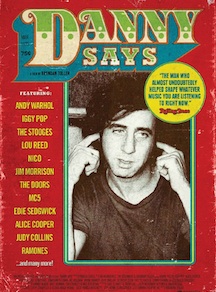By Krysta M. Larson
Danny Says, a documentary about the impact that Danny Fields (ΦBK, University of Pennsylvania, 1959) had on music in the late 20th century, premiered in 2015 and was released for a limited run in theaters on September 30 this year. The film focuses on the influence Fields weilded for a wide variety of musical artists and genres. Fields is perhaps best known for his discovery of the MC5, the Stooges, and the Ramones, three groups that contributed significantly to the punk rock movement in the United States.
Born Daniel Feinberg in Queens, New York in 1939, Fields attended the University of Pennsylvania at age 15 and graduated with Phi Beta Kappa honors at age 19. He was sixth in his class of over 1,000 students and the youngest person to graduate that year. Though he attended Harvard Law School, he was unable to connect with other students due to his young age and dropped out his first year to pursue a career in publishing.
In the 1960s, Fields became involved with Andy Warhol’s social circle, a group that included people like actress Edie Sedgwick (with whom he occasionally shared an apartment), filmmaker Paul Morrissey, and musician Lou Reed. His career in publishing began with Liquor Store Magazine, which, as the title suggests, was sent to liquor stores around the nation. He eventually became the managing editor of the teen magazine Datebook, which in 1966 published a quote from John Lennon where he claimed that the Beatles were more popular than Jesus. The story resulted in massive protests during the Beatles’ tour of the United States, largely in the South, and contributed to the end of their touring career.
In 1968 Fields was hired by Elektra Records to gain publicity for the Doors. His influence caused “Light My Fire,” originally seven minutes long, to be cut down to three minutes and made the single for their first album. As director of publicity, Fields played a large part in making Jim Morrison a teen idol and increasing the band’s fanbase. Also in that year, he discovered the MC5 and the Stooges playing at local performance venues in Detroit. He encouraged Elektra to offer contracts to both bands; these groups would heavily impact the punk music scene in both the United States and the United Kingdom in the 1970s.
One of the greatest moments of Fields’ career was his discovery of the Ramones, a major punk rock band, in 1975. After hearing the Ramones perform at a small club in New York, Fields asked to be the band’s manager and helped them sign with Sire Records. His influence allowed the group to tour in England, where they gained international recognition. Their song “Danny Says,” released in 1980, alludes to Fields and provides the inspiration for the documentary’s title. The Ramones were listed as number 26 out of 100 of Rolling Stones’ greatest artists of all time, were named as the second greatest band of all time by Spin magazine (second only to the Beatles), and received a Lifetime Achievement Grammy in 2011.
Throughout the documentary, the artists interviewed attest to Fields’ commitment to discovering new styles of music that no one else recognized as groundbreaking or influential. Manager and journalist Danny Goldberg said that Fields put artists on the map; he did not consider making money to be a sign of success, but determined an artists’ success based on whether they achieved greatness. Legs McNeil, a music journalist, claimed that Fields’ legacy was helping other people achieve their artistic visions. A 2014 New York Times article stated that one “could make a convincing case that without Danny Fields, punk rock wouldn’t have happened.” Fields himself, who was interviewed throughout the documentary, said that one of his main objectives during his career was “to do something new that no one’s ever done before.” Fields’ influences on popular artists in the second half of the 20th century demonstrate the significant impact that this approach had during his extremely successful career.
Krysta M. Larson is a senior at Creighton University double majoring in English and journalism. She is a recently inducted member of Phi Beta Kappa. Creighton is home to the Beta of Nebraska Chapter of Phi Beta Kappa.




